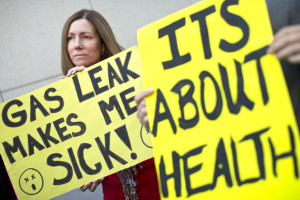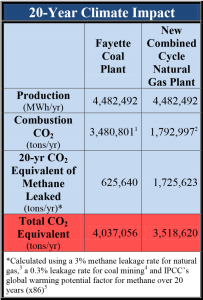
Porter Ranch – photo by Maya Sugarman KPCC
The massive natural gas leak in Porter Ranch, CA, just outside of Los Angeles, has been temporarily capped. That’s the good news. The bad news is that the leak isn’t yet permanently stopped and that it has already done incredible damage over the 111 days it spewed methane and toxic chemicals into the air.
The state of emergency called by Governor Jerry Brown is still in effect for what is being named the largest environmental disaster since the BP oil spill. Over 94,700 metric tons of methane has escaped since October 23, which is one of the largest leaks ever recorded. This incident has taken California two steps back in its progress towards greenhouse gas emissions reductions especially since methane is 87 times more potent of a greenhouse gas than carbon dioxide. For perspective, the amount of methane released so far from the natural gas leak will have the same impact on climate over the next twenty years as emissions from seven coal power plants. Despite these environmental crimes, not one person has been arrested, although this past week, the citizens of Los Angeles County have begun taking legal action.
Southern California Gas Co (SoCal Gas), a subsidiary of Sempra Energy, is the responsible company for the Aliso Canyon Methane Leak, and is finally facing charges for this disaster. District Attorney Jackie Lacey announced the criminal charges filed against SoCal Gas for failing to immediately report the gas leak at its Aliso Canyon facility to the proper state authorities. The site leaked for three days before SoCal Gas officials contacted the city’s fire department.
Major public health concerns are also leading to lawsuits. Residents across the county are reporting health issues such as nose bleeds, female health problems (excessive bleeding), rashes, vomiting, headaches, and dizziness, and have packed town hall meetings voicing their concerns. One Porter Rach resident, Christine Katz, stated, “Even though you can’t see the gas, it’s there. And that’s the saddest part — people don’t understand it. Because it’s not a mudslide, it’s not an earthquake. You just don’t see the devastation, but it’s there.”
SoCal Gas has yet to release a full listing of the chemicals being emitted from the leak, furthering distrust and anxiety from the community. Local law firms have organized a website (www.porterranchlawsuit.com) for citizens to reach out if they have been impacted. More than 25 lawsuits have been filed pursuing damages from the SoCal Gas and Sempra Energy. For example, a family of an elderly woman has filed a wrongful death lawsuit against the gas company, claiming that the leaking chemicals led to the worsening of her health and untimely death this past January.
Legal actions will certainly hurt these gas companies financially, but is this an effective way of enforcing the law? History says no. Time and time again, environmental crimes are punished with fines, and these disasters continue to happen putting the public at risk. New regulations, transparency, and stricter criminal enforcement on the individuals responsible very well could bring justice in these incidents.
Crimes committed under a corporate veil are still crimes and should be treated as such. No amount of money will ever reverse the harsh health and environmental effects the Aliso Canyon Methane Leak is having on the region. But we can put into place policies that make corporations take the environmental risks of their operations much more seriously. A proactive justice process would be exponentially more effective means of dealing with environmental crimes than merely reacting after the fact.




